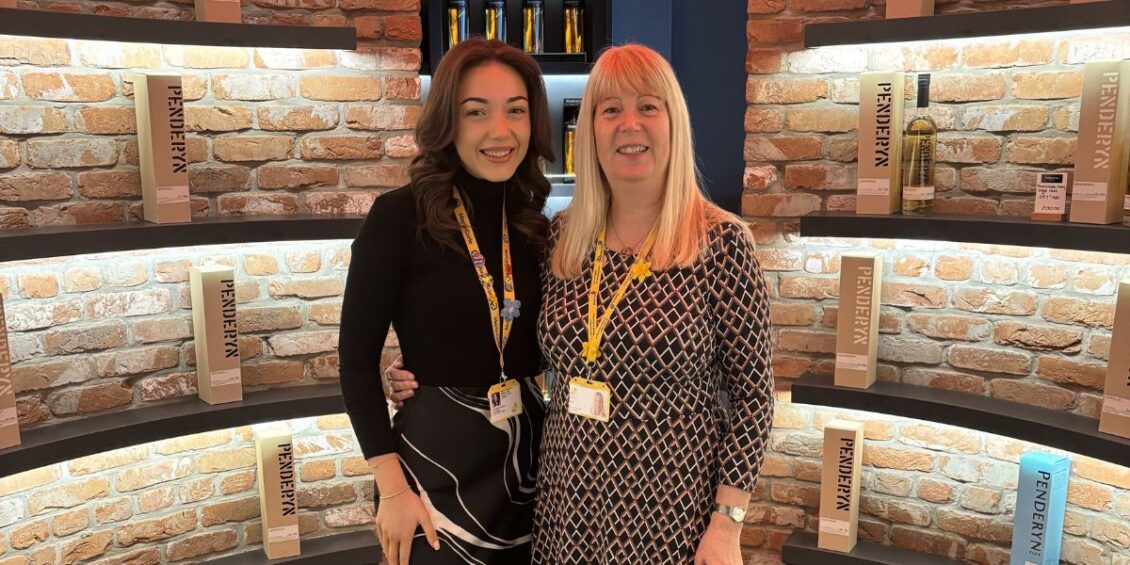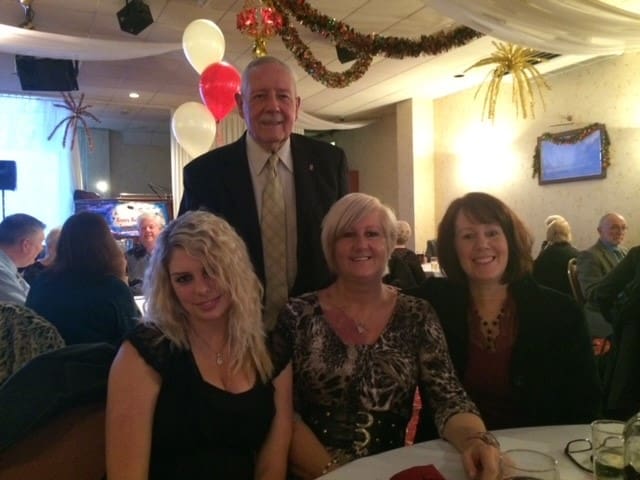After caring for their father for 3 years, sisters Chris and Sue praise the Marie Curie “angels” who gave them support in his final three weeks – but say they wish they’d known the support was available sooner.
Now the pair are urging others to learn more about Marie Curie, which cares for people with any illness they are likely to die from, and those close to them, so they know where to turn during difficult times.
Brian Jones was 91 when he died at home in Rhos in the Swansea Valley, surrounded by his family, having received both specialist dementia support and Hospice Care at Home support from Marie Curie, the UK’s leading end of life charity.
Sharing their story during Dementia Action Week, Christina Maguire and Sue Bradley had supported their father in his final years at home, but in the final few months were struggling with the amount of support he needed – especially as Chris was also undergoing diagnosis and cancer treatment herself.
When they heard about the charity’s West Glamorgan Respite Dementia Service they said they were “desperate” to have the support from them.
“The district nurse mentioned Marie Curie and said you as a charity had just started a dementia support service and that she would refer us to them,” said Sue, who also lives in the Swansea Valley.
“Two weeks later my daughter phoned, and the very next day Marie Curie got in touch.”
Her sister, Chris, added: “We thought he was dying at this point, he wasn’t improving in any way…..and we were really struggling at that time.”
Prior to receiving Marie Curie support, the pair praised the at home carers they had from social services– but were devastated when they heard that care was going to be withdrawn within the last month of his life. This was later reinstated when the family said they would complain to Care Inspectorate Wales.
Brian had aphasia with his dementia, which impacted his ability to make a decision. Talking about caring for him at home, Sue said: “There’s just so much to do, even when you’re in your own home, you’ve still got to do prescriptions, collect tablets, phone for pads, phone District Nurses, it’s just constant all the time. Then meals, he couldn’t make a decision. He couldn’t find the words, and it was gradually getting worse.
“Which is why we were concerned about him going into hospital, because he wouldn’t be able to communicate.”
The pair joked that they would give him a menu for his dinner – but all he ever wanted was egg and chips.
“I said oh it doesn’t matter, if that’s what he wants let him have it at his age,” said Chris.
Brian had his dementia diagnosis around 18 months prior to his death, after a referral to Tonna Hospital who assessed him at home. A scan showed vascular dementia.
They set up a camera in his home and would take turns to be on call to watch and listen to him – with Sue taking him for a walk daily.
Talking about Marie Curie’s first visit, Chris said: “Marie Curie were like angels coming along. They were just so needed and so lovely that you just felt fine about going and leaving him in their care. You just had total faith in them – obviously, hand-picked for the job.”
Sue added: “All of a sudden, we were having this support. I said I don’t like to say yes, there must be others out there who need the support and the person at Marie Curie who booked the visits said: ‘Take it, it wouldn’t be offered to you if we didn’t think you needed it’. It was a blessing, because you felt you didn’t have to look at the camera. You could relax, knowing he was in safe hands.
“Robyn, the healthcare assistant from Marie Curie came in and knelt down and held his hand. When we came back, she said ‘He got fed up with me holding his hand eventually’.
“If we’d had Marie Curie come in the last 10 weeks, it would have made a massive difference.”
The family later had support from the charity’s Hospice Care at Home service with a night visit the night he died.
The Marie Curie Healthcare Assistant who was there, Wendy, woke the family when Brian’s breathing became shallower, allowing them to be there to hold his hand when he took his final breath.
“The nurse was really lovely and confirmed he had died, and obviously we were upset, and she gave us a hug and she was just lovely. Stayed with us, the DNs [District Nurses] came and then the undertaker,” said Chris.
“We did have every confidence in her and all of them. They stood out a mile. They were excellent, we can’t talk highly enough of them.”

Alongside the clinical services, the charity also has a Dementia Companion volunteer service – with volunteers providing a minimum of 3 hours of support to patients and their families in the community across Swansea Bay.
The service works alongside the Respite service – offering support within the last 12 months of life.
Eve has been a volunteer for more than a year. She was inspired to sign up after her father-in-law was cared for by the charity’s nurses and wanted to give something back.
“The thing I love most about volunteering is the difference I’m making to people’s lives,” said Eve Morse of Swansea.
“My grandma had dementia and my mother’s friend, and we had nobody to help us and it was really difficult.
“I feel like I’ve made a real difference to the family I’m supporting, because when I take my gentleman out for two or three hours, his wife when we get back has been able to have a shower, sit down and have some time on her own and not have to worry about him.
“He’s in hospital now and that’s caused new challenges for her, but it’s just so rewarding to see how I can help them to live their lives as normally as possible.”
Eve still continues to support the couple while the husband is in hospital – taking his wife back and forth and also visiting on her own when the wife can’t.
“Without this service, I don’t know what would have happened to this family I’m supporting,” she said.
She said her support had also allowed the husband to reconnect with his local community, which he had done a lot for in his past.
The Companion service has a waiting list, with the charity in need of more volunteers to help support people in vital need across Swansea Bay.
Marie Curie Companion volunteer coordinator for Swansea Bay, Chloe Abraham, added: “Our dementia services are so vital to supporting people at end of life. I describe them as like a cup of tea and a biscuit – they are both great on their own, but together our respite service and Companion service are just so much better. We’d be delighted to talk to anyone who is able to give some of their time to support people in their community – give us a call if you think it’s something you’d like to do.”

